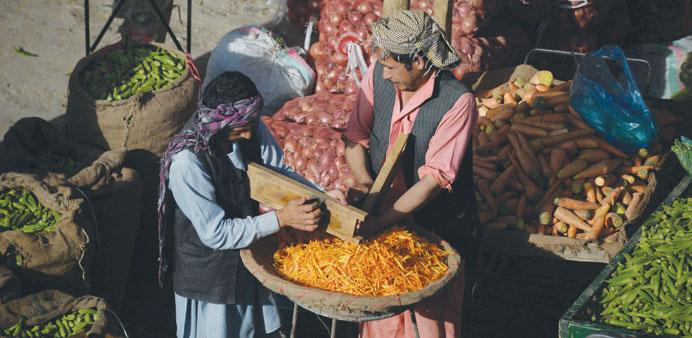AFP/Kabul
Afghan presidential candidate Abdullah Abdullah was locked in last-chance talks yesterday with the UN as a deal to resolve the country’s damaging election dispute edged closer to failure.
Abdullah alleges that ballot-rigging denied him victory over Ashraf Ghani in the June 14 election to choose a new leader in Afghanistan as US-led Nato troops end their 13-year war against the Taliban.
With both candidates claiming victory, the US brokered a deal in which the poll rivals agreed to an audit of all 8mn votes and the formation of a post-election national unity government.
But Abdullah pulled out of the audit, saying it was failing to uncover fraud, and he has threatened to also walk out of power-sharing talks - throwing into question the legitimacy of the next government.
“Negotiations between special UN envoy Jan Kubis and Dr Abdullah are being held and when the talks finish we will know what the final stand is,” Muslim Saadat, a spokesman for the Abdullah campaign, told AFP.
“A press conference has been postponed due to requests from ambassadors, the UN and the international community.
“There were no meetings between the two sides today, after they could not reach an agreement on Monday.
“For Dr Abdullah and the whole team, it is very clear to us we were the winner.”
The political crisis has already emboldened the Taliban and weakened the fragile economy, which depends on aid funding from countries that hoped the election would underline democratic progress made since the Taliban era.
A Nato summit opening in Britain tomorrow was meant to showcase the new president as member nations decide on future support, but instead the Afghan defence minister will represent the country.
Outgoing President Hamid Karzai, who was scheduled to leave office one month ago, has declined to attend, and has stressed he will step down as soon as his successor is chosen.
“Candidates must remain committed to form (a) national unity government that ensures stability and security,” the US embassy said in a message on Twitter as Afghanistan faces the threat of political turmoil spilling into violence.
The UN has raised concerns of a return to the ethnic divisions of the 1990s civil war because Abdullah draws his support from Tajiks and other northern Afghan groups, while Ghani is backed by Pashtun tribes of the south and east.
Faizullah Zaki, a spokesman from Ghani’s campaign, told AFP that Abdullah should lower his demands over the unity government and re-join the negotiations.
Some of Abdullah’s aggrieved supporters have urged him to form a “parallel government”, while officials denied reports that current ministers planned to set up an “interim administration” to take power.

An Afghan farmer sells fruit and vegetables at a market in Mazar-i-Sharif.
